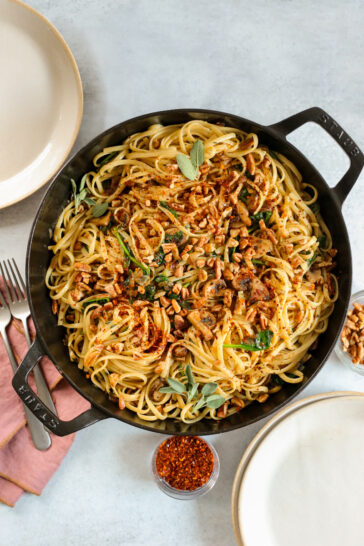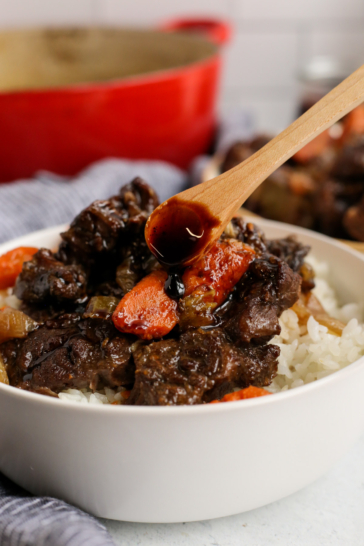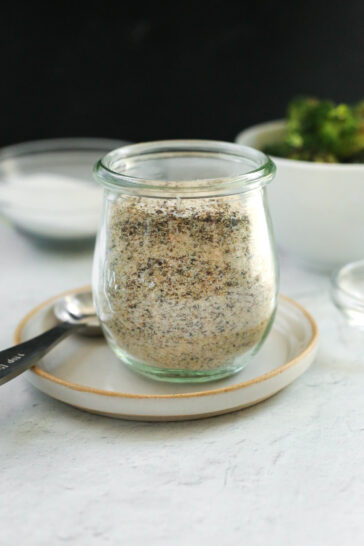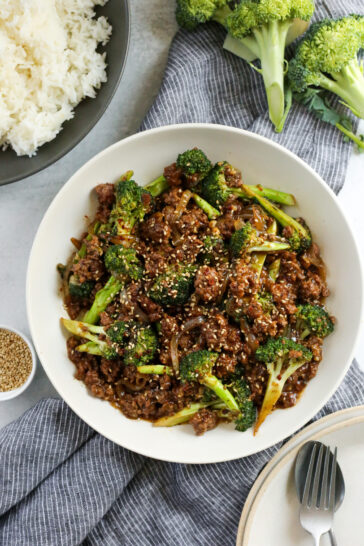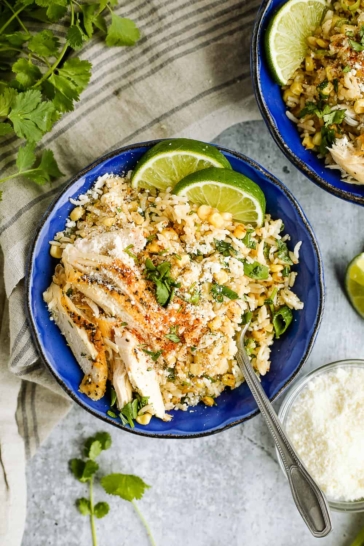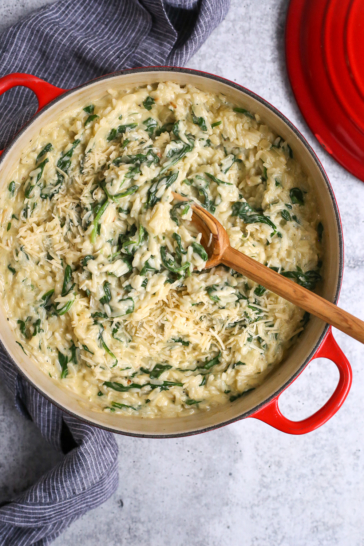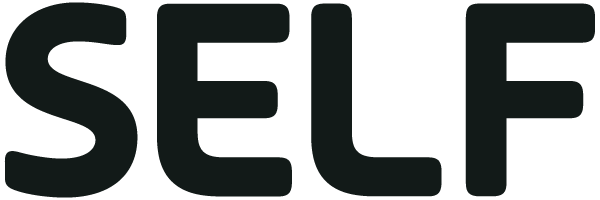Looking for the best anti-diet books? Start with these ten titles to learn more about the history of diet culture, the wellness industry, and social justice issues. Whether you’re new to an intuitive eating journey or well-versed in a non-diet approach, these are the best books to deepen your understanding of diet culture and find your own path to body liberation.
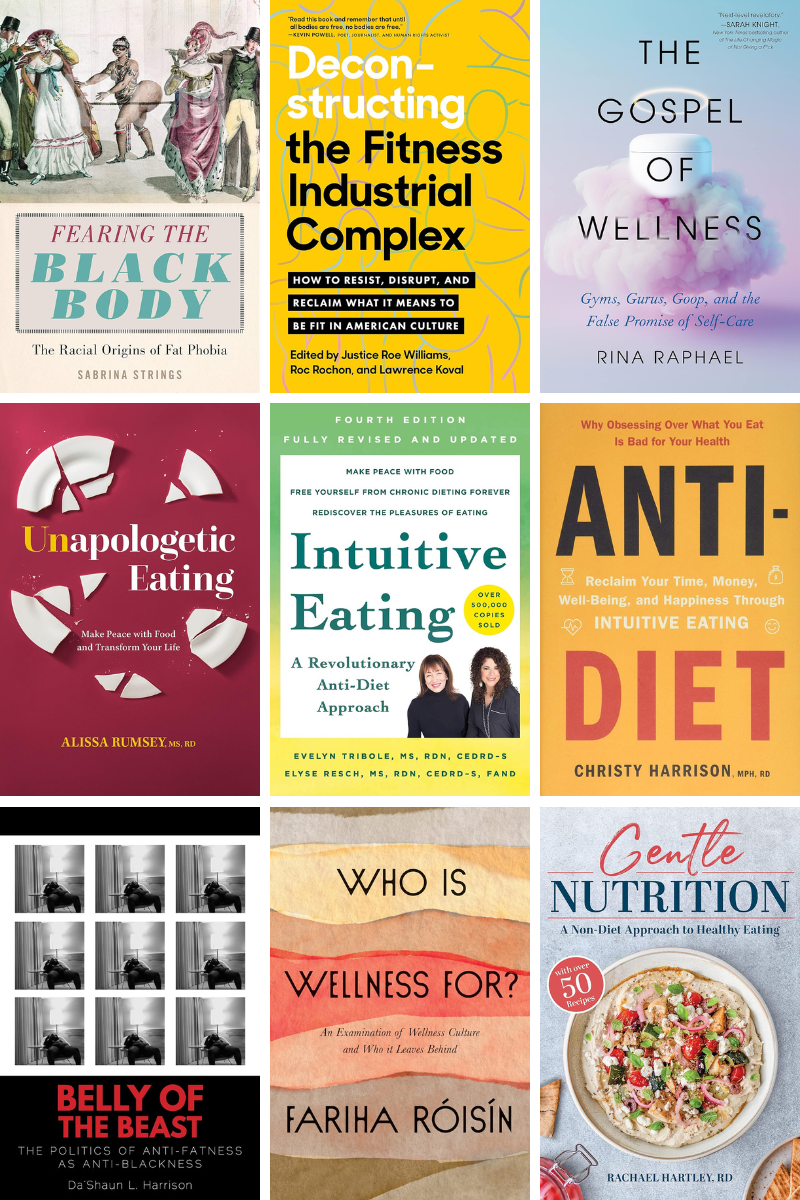
Social media is a great way to learn about new ideas and connect with people and professionals doing anti-diet work. But it’s not the only way, and I would argue not even the best way.
These are titles I want to offer up as a starting point or supplement to the other work you may be doing. That could include (but is not limited to) working with a Health at Every Size® or HAES-informed dietitian or healthcare professional, individual or group counseling, eating disorder treatment or recovery support, or other professional guidance or medical management. I strongly encourage you to read the full descriptions and book reviews to determine if it’s worth a read.
These are affiliate links (meaning, I will earn a small commission if you click through and purchase). But you can also borrow these titles from libraries or buy used. Some are available on audiobook or e-reader for accessibility as well.
I am a registered and licensed dietitian, but that does not mean I am your dietitian. The information shared and posted on this blog is simply meant to provide education and inspiration. It is not a substitute or replacement for medical advice, medical nutrition therapy, or individualized nutrition counseling. I will always recommend that you speak with your primary healthcare provider before making any changes to your diet or lifestyle.
So with that lengthy disclaimer out of the way, let’s get into the list! In no particular order, there are the first books I would recommend reading.
Best Anti-Diet Books (click to jump ahead)
Recommended Reading for Intuitive Eating Beginners
First things first: let’s go back to the basics! It’s probably no surprise that the original intuitive eating book is first on this list of best anti-diet culture books.
All too often I hear people referencing or debating against an intuitive eating approach who haven’t read the book. Even if you’re skeptical, it’s worth checking out for an introduction to this alternative to weight loss-driven diet advice.
Intuitive Eating, 4th Edition
Intuitive Eating: A Revolutionary Anti-Diet Approach was indeed revolutionary when first published in the 1990s. Written by dietitians Evelyn Tribole and Elyse Resch, it was the first book that outlined the 10 principles of intuitive eating (IE). It took nearly two decades for IE to find its footing and start gaining mainstream traction. To say this approach was ahead of its time is a bit of an understatement.
With #IntuitiveEating growing more trendy by the day on social media, I think it’s imperative to start at the source to fully understand the framework. It’s worth building a foundational understanding of each of the 10 principles. Plus, the 4th Edition has been updated with some key changes. There’s newer research to support IE-focused interventions and more inclusive language where previous editions were lacking.
When I first embarked on my own healing journey with food, movement, and body image, I fell just short of worshipping this book. I still credit it with being the first tangible step I took to becoming the type of dietitian and person I am now. But that’s not to say I think it’s the best anti-diet book. It fails to address the systemic issues at play and remains focused more on what an individual can or should do versus advocating for the collective change we really need.
So for those reasons, I still recommend starting here….but don’t stop with just this book.
When You’re Ready for a Critical Look at Diet Culture
When you’re ready to peel back the layers of weight stigma, white supremacy, patriarchy, and the system of beliefs that prop up toxic diet culture, work your way through these titles.
Fearing the Black Body
“Fearing the Black Body: The Racial Origins of Fatphobia” by Dr. Sabrina Strings focuses on how anti-Blackness and racist beliefs shaped our modern preoccupation with thinness and status.
Pulling from primary sources dating back to the Renaissance, Dr. Strings will guide you through history, art, scientific research, and the media to illustrate how our deeply entrenched beliefs about body size and fatness came to be. The books also examines how we falsely assume our fear of fatness stems from a concern over health. Rather, that came after an association between body size, race, and class was already established across Europe and the United States.
This book is meticulously researched, and as a result can feel pretty academic. I recommend taking your time with it. Go into this book with an open mind and willingness to challenge whatever you currently believe about bodies, beauty, and health. It is guaranteed to bring up some discomfort for you if you hold multiple privileged identities. But it’s an important next step to dismantling diet culture and fatphobia.
Belly of the Beast
“Belly of the Beast: The Politics of Anti-Fatness as Anti-Blackness” by Da’Shaun L. Harrison builds on the themes presented in “Fearing the Black Body”.
Don’t mistake this text for a health- or nutrition-focused book. It is a critical examination of interconnected issues of desirability and gender, the “war on obesity”, and policing and abolition. But it all connects back to an anti-diet approach because we cannot keep promoting self-care as a path to self-worth when societal structures make that difficult or impossible for folks in marginalized bodies.
Consider this book a starting point for additional independent reading and research. At only 109 pages, it’s a shorter read but you will gain historical context up to the present day. More importantly, you will hear about it through Harrison’s voice as a fat, Black, disabled, and nonbinary trans writer. This book will also introduce you to voices and writings you may not be familiar with. They include a forward written by Kiese Laymon (author of the memoir “Heavy“) and references to Sonya Renee Taylor’s book, “The Body Is Not An Apology.”
The Gospel of Wellness
In 2023, Rina Raphael published “The Gospel of Wellness: Gyms, Gurus, Goop, and the False Promise of Self-Care.” As a journalist, she turns a critical eye towards the wellness industry that rakes in billions of dollars every year. How can we feel so “unwell” as we invest in self-care more than ever?
Peel back the layers of catchy marketing, quick-fix promises, and almost cult-like reverence for celebrity trainers and influencers. This book will shed light on the seductive messaging of diet culture and how it promises one thing we all seem to be looking for: some semblance of control in an uncontrollable world.
Whether or not you’re a religious person, this book is worth a read. You’ll better understand how our societal relationship with dieting was strengthened as cultural norms around organized religion relaxed. From mirroring the language to enlisting new followers in a vulnerable state of mind to associating moral virtue with “clean eating”…I found this book extremely thought-provoking. You’ll consider diet culture beyond the diets themselves and start to see parallels to other cultural phenomenons like MLM schemes and group fitness classes.
But it’s not all bad, as the author also offers hope for something better. She herself managed to escape this doctrine of wellness worshipping to find a life with more balance. And so can you.
Who Is Wellness For
Immediately after reading “The Gospel of Wellness” you should start reading “Who Is Wellness For.” Or, better yet, read this one first. Written by Fariha Róisín, the subtitle of this book lets you know why it’s an essential read: “An Examination of Wellness Culture and Who It Leaves Behind.”
It covers many of the same topics as the previous book on this list. But I like that there are aspects of a memoir woven throughout. There is more discussion addressing the way whiteness co-opts wellness practices from Indigenous cultures around the globe. There are also more connections forged between trauma, fat phobia, healing modalities, and the way wellness culture tries to superficially soothe symptoms that point to systemic injustices.
One of the sections that I really absorbed from this book is about degrowth. Or, the critique of economic growth. As the author writes, this is literally the concept of degrowing, “buying less, consuming less, only using what you need. But it’s an ideology for the privileged, not for the poor or homeless.” It paints a parallel between consumerism and other habits associated with wellness culture, which are further explored in the book. This one stands out to me because it’s such a clear example of how marginalized individuals are often expected to equally contribute to the solutions to problem they didn’t cause.
If you’re ready for a critical and necessary look at the systems at play behind wellness culture, written from the perspective of a Muslin queer Bangladeshi author, consider this a must-read.
Deconstructing the Fitness Industrial Complex
What does it mean to be fit? “Deconstructing the Fitness Industrial Complex” asks this question and earnestly pursues the answer through a collection of essays. Compiled by Justice Roe Williams, this book includes chapters from activist trainers, coaches, and bodyworkers with a multitude of intersecting and marginalized identities.
Move beyond the superficial platitudes of sayings like “fitness is for all bodies” to truly get to the heart of what many multi-privileged folks (myself included) take for granted in fitness spaces. Fitness is subjective, yet often used as a standard against which all bodies are compared. In this way, the fitness industrial complex mirrors the larger systems that perpetuate harm.
Note that this book is specifically written for BIPOC, queer, trans, disabled, and chronically ill readers. If you don’t share those identities or have those lived experiences, be prepared to pause and make space. Get ready to ask yourself what internalized beliefs you hold about health, fitness, and bodies that don’t conform. Plus, stretch your imagination and creativity to envision what a truly inclusive fitness space could and should look like.
This book serves as an introduction to radical self-love, body acceptance, community care, and healing-oriented strategies through a fitness-focused lens. After reading it, I doubt you’ll ever think of exercise or fitness in the same way.
Best Anti-Diet Books by Registered Dietitians
Dietitians are the nutrition experts. So it makes sense that many of us have authored books based on our own experiences working with clients or patients for lifestyle changes that have nothing to do with weight-loss efforts. When you’re ready to reintroduce nutrition in a compassionate way, start with these books.
Anti-Diet
Christy Harrison’s book “Anti-Diet” was considered groundbreaking when it was published in 2019. As the long-time host of the Food Psych podcast, journalist and dietitian Harrison was well-positioned to write about the historical, sociocultural, and scientific facts that have contributed to pervasive diet mentality.
This book busts the myth that thinness equates beauty, health, and happiness. It also clearly exposes the harmful effects of chronic dieting, weight cycling, and restriction on both physical and mental health. The first part of the book personifies diet culture as “the life thief”. Then it transitions into actionable steps to help you reclaim your time, money, and happiness through intuitive eating.
This book can feel like a more in-depth intuitive eating guide when compared to the original IE book. I think it makes an earnest attempt to use more of a social justice lens. Harrison tries to address nuanced issues like how your ability to practice IE is limited because of food insecurity, poverty, or other systemic issues.
There is plenty of practical advice to be found within. Plus, thoroughly researched facts and personal anecdotes from an expert in the subject. This may be helpful if you’re struggling to articulate your views or advocate for yourself when you encounter questions as to why you’re not dieting anymore.
Unapologetic Eating
“Unapologetic Eating” by dietitian Alissa Rumsey was published in 2021. And I think one of the reviews on the Amazon listing sums it up well: “If you suspect that counting almonds can’t possibly be the way to happiness, this book is for you!”
And I think that sums up a lot of people’s experience with moving away from diets. A seemingly small behavior points to not just restriction around what you eat, but restriction in other areas of life, too. This book challenges conventional norms around foods and eating. And while the focus begins with unapologetic eating, you soon will realize that can translate into unapologetic living.
The writing style is compassionate, supportive, and relatable. This book serves as an invitation to break free from personal and societal expectations of performative habits. Easier said than done if you’ve been dieting for a long time. But this book offers a different way to approach that transition.
Once again, the contents are crafted from the principles of IE but take it much further. This book will guide you through phases of fixing, allowing, feeling, and growing (Part 1-4, respectively). There are entire chapters dedicated to such specifics as “How to Honor Your Inner Wisdom” and “Redefining Your Relationship with Your Body.” Although it’s one of the longer reads on this list of best intuitive eating books, it’s engaging, insightful, and worth checking out.
Gentle Nutrition
My copy of “Gentle Nutrition” by fellow dietitian Rachael Hartley is well-used. You’ll find it on the corner of my desk versus on the shelf most of the time!
It focuses on the 10th and final principle of IE, which is “honor your health with gentle nutrition.” It’s the last principle for a reason. Focusing on nutrition too early in your anti-diet journey can backfire back into a a form of restriction. But all too often IE is mistakenly painted as being anti-nutrition and that is simply not the case.
The strategies offered in “Gentle Nutrition” are based in nutrition science, but are straightforward with an emphasis on satisfaction. Consider this a primer on nutrition-related topics that will help you nourish yourself as you let go of diet culture.
As the only book on this list that offers recipes, I think you’ll enjoy the format. Especially if you’re someone who wants to start using practical knowledge right away. Hartley has been a food blogger longer than I have, so expect well-tested recipes with bright, colorful, vibrant images. With a brand that embodies the joy of eating, you can expect more of the same from this book.
And unlike many other cookbooks, no trace of diet talk, ingredient shaming, or calorie counting to be found.
Healthy Eating for Life Workbook
And last but not least, I’m including a workbook written by yours truly.
That’s right! I wrote “Healthy Eating for Life: An Intuitive Eating Workbook to Stop Dieting Forever” in 2019. I pulled from my professional experience working as a registered dietitian, as well as my own journey to a better relationship with food.
The six sections of this workbook will guide you towards identifying what a life without dieting looks like for you. The many open-ended journaling prompts and guided activities are designed (very intentionally!) to have no “right” or “wrong” answer. In fact, I encourage anyone who completes the workbook to go back months or even years later to repeat some of the prompts. You might be surprised to see how your responses change.
The last section can be especially helpful for anyone ready to start implementing what they’ve learned. Not only about a non-diet approach, but also themselves. Once you figure out what you really need and want from your lifestyle, you’ll be able to develop a plan that suites you better than any diet ever could.
I hope you enjoy this list of what I consider some of the best anti-diet books. These authors write honestly and candidly, sharing their personal stories along with professional expertise.
This list was limited to just ten books, which is far from being a complete collection. If you have other titles you love and would recommend to other people, please share them! Leave a comment and I would love to hear from you.
As always, thanks for checking out the Street Smart Nutrition blog. Cheers to more fearlessly nourishing meals!

